 The majority of chronic ailments, including autoimmune diseases like rheumatoid arthritis, depression, Alzheimer’s disease, diabetes, and cancer, involve inflammation. Science has known for a long time that omega-3 fatty acids counteract inflammation. A study from the University of Illinois, USA, shows that the process is controlled by cannabinoids, which the body itself can produce but are also found in cannabis oil. In other words, it is possible to activate the body’s cannabinoid receptors in the immune system and nervous system by means of large quantities of fish oil, which contains the most active forms of omega-3.
The majority of chronic ailments, including autoimmune diseases like rheumatoid arthritis, depression, Alzheimer’s disease, diabetes, and cancer, involve inflammation. Science has known for a long time that omega-3 fatty acids counteract inflammation. A study from the University of Illinois, USA, shows that the process is controlled by cannabinoids, which the body itself can produce but are also found in cannabis oil. In other words, it is possible to activate the body’s cannabinoid receptors in the immune system and nervous system by means of large quantities of fish oil, which contains the most active forms of omega-3.
- and preventing cancer from spreading
 Vitamin B6 is needed for over 150 enzyme processes and has an overlooked role in the prevention of inflammation, which is a common thread in most chronic diseases, including cancer. Severe vitamin B6 deficiencies are rare, but scientists believe that even moderate deficiencies of the nutrient can increase the risk of many diseases. Deficiencies and poor utilization are a result of unhealthy diets, ageing, stimulant abuse, hormone pills and certain medical drugs, which means that many people are at risk of lacking this important vitamin.
Vitamin B6 is needed for over 150 enzyme processes and has an overlooked role in the prevention of inflammation, which is a common thread in most chronic diseases, including cancer. Severe vitamin B6 deficiencies are rare, but scientists believe that even moderate deficiencies of the nutrient can increase the risk of many diseases. Deficiencies and poor utilization are a result of unhealthy diets, ageing, stimulant abuse, hormone pills and certain medical drugs, which means that many people are at risk of lacking this important vitamin.
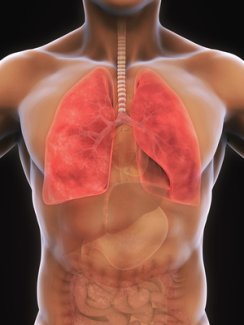 Taking a supplement of vitamin D in combination with your prescription asthma medicine may halve your risk of an asthma attack that would require hospitalization, according to a new meta-analysis from Queen Mary University in London (QMUL). A vitamin D deficiency alone, which is rather common at northern latitudes, can increase the risk of asthma. Therefore, it is vital to make sure to have sufficiently high levels of this nutrient all year round to protect your respiratory tract.
Taking a supplement of vitamin D in combination with your prescription asthma medicine may halve your risk of an asthma attack that would require hospitalization, according to a new meta-analysis from Queen Mary University in London (QMUL). A vitamin D deficiency alone, which is rather common at northern latitudes, can increase the risk of asthma. Therefore, it is vital to make sure to have sufficiently high levels of this nutrient all year round to protect your respiratory tract.
 Vitamin C is essential for the immune defense for a number of reasons. According to a review of 12 recent studies, vitamin C administered in sufficiently high doses can prevent severe COVID-19 infections and save lives. The problem is that most people fail to follow the official dietary guidelines for fruit and vegetable consumption, which is why so many people lack vitamin C. Another thing is that health authorities in general are unaware of the health benefits of vitamin C in therapeutic doses, even after 80 years of international research.
Vitamin C is essential for the immune defense for a number of reasons. According to a review of 12 recent studies, vitamin C administered in sufficiently high doses can prevent severe COVID-19 infections and save lives. The problem is that most people fail to follow the official dietary guidelines for fruit and vegetable consumption, which is why so many people lack vitamin C. Another thing is that health authorities in general are unaware of the health benefits of vitamin C in therapeutic doses, even after 80 years of international research.
 One in nine Danish women gets breast cancer. Diet and lifestyle play a major role, and now an American study shows that omega-3 fatty acids, which are typically found in oily fish and fish oil supplements, may help prevent breast cancer cells from growing and spreading. According to lead investigator Saraswoti Khadge, who is affiliated with the University of Nebraska Medical Center, omega-3 fatty acids support the body’s immune defense and certain anti-inflammatory mechanisms. This study is in line with earlier research, so it may very well be prudent to make sure to get plenty of omega-3 for preventing and treating breast cancer.
One in nine Danish women gets breast cancer. Diet and lifestyle play a major role, and now an American study shows that omega-3 fatty acids, which are typically found in oily fish and fish oil supplements, may help prevent breast cancer cells from growing and spreading. According to lead investigator Saraswoti Khadge, who is affiliated with the University of Nebraska Medical Center, omega-3 fatty acids support the body’s immune defense and certain anti-inflammatory mechanisms. This study is in line with earlier research, so it may very well be prudent to make sure to get plenty of omega-3 for preventing and treating breast cancer.
 According to Bruce Ames, an American biochemist, ageing processes are largely due to lack of nutrients. One important contributing factor is the fact that our uptake and utilization of vitamins and minerals decrease with age. In addition, a lot of different types of medicine block our ability to utilize different nutrients. As a result of this, many of our enzyme processes slow down, making our cells increasingly vulnerable and that increases our risk of disease. Nonetheless, there is a lot we can do to optimize our intake and utilization of nutrients, particularly with respect to vitamin B12, vitamin D, calcium, iron, selenium, and zinc. It is also worth taking a look at Q10 for energy turnover and melatonin for healthy sleep. Our endogenous synthesis of both compounds decreases with age.
According to Bruce Ames, an American biochemist, ageing processes are largely due to lack of nutrients. One important contributing factor is the fact that our uptake and utilization of vitamins and minerals decrease with age. In addition, a lot of different types of medicine block our ability to utilize different nutrients. As a result of this, many of our enzyme processes slow down, making our cells increasingly vulnerable and that increases our risk of disease. Nonetheless, there is a lot we can do to optimize our intake and utilization of nutrients, particularly with respect to vitamin B12, vitamin D, calcium, iron, selenium, and zinc. It is also worth taking a look at Q10 for energy turnover and melatonin for healthy sleep. Our endogenous synthesis of both compounds decreases with age.
- and for the prevention of allergies and inflammation
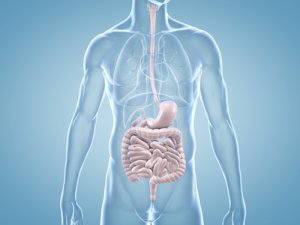 Every day, the intestinal immune system has to defend itself against hordes of microbes and toxins. If it fails to function optimally, there is an increased risk of infections, allergies, and inflammatory diseases. More and more research reveals that essential nutrients help to control the intestinal immune defense. Also, new research shows how important a well-functioning immune system is for our digestion and health in general. This article takes a closer look at the vitamins that are known to be particularly important for the intestinal immune system. Another thing that is vital is to have adequate amounts of gastric juice.
Every day, the intestinal immune system has to defend itself against hordes of microbes and toxins. If it fails to function optimally, there is an increased risk of infections, allergies, and inflammatory diseases. More and more research reveals that essential nutrients help to control the intestinal immune defense. Also, new research shows how important a well-functioning immune system is for our digestion and health in general. This article takes a closer look at the vitamins that are known to be particularly important for the intestinal immune system. Another thing that is vital is to have adequate amounts of gastric juice.
- a typical problem that is seen with ageing, overweight, diabetes and other chronic diseases
 Chronic low-grade inflammation has a negative effect on our health. It pummels the body with free radical damage to healthy cells and tissue. Chronic low-grade inflammation is linked to ageing, overweight, type 2 diabetes, cardiovascular disease, and other health problems. In the case of infections, there is also a risk that the immune defense overreacts with hyperinflammation, which can turn out to be very problematic. Now, science has discovered that our gut flora also affects the immune system. Some gut bacteria have a pro-inflammatory effect, while others help fight inflammation. Fish oil’s anti-inflammatory effect involves other mechanisms. Supplements of beneficial gut bacteria, better known as probiotics, and fish oil supplements help increase gut flora diversity. This is good for fighting inflammation, according to a new study published in Nutrients. Another thing to make sure of is to get enough vitamin D.
Chronic low-grade inflammation has a negative effect on our health. It pummels the body with free radical damage to healthy cells and tissue. Chronic low-grade inflammation is linked to ageing, overweight, type 2 diabetes, cardiovascular disease, and other health problems. In the case of infections, there is also a risk that the immune defense overreacts with hyperinflammation, which can turn out to be very problematic. Now, science has discovered that our gut flora also affects the immune system. Some gut bacteria have a pro-inflammatory effect, while others help fight inflammation. Fish oil’s anti-inflammatory effect involves other mechanisms. Supplements of beneficial gut bacteria, better known as probiotics, and fish oil supplements help increase gut flora diversity. This is good for fighting inflammation, according to a new study published in Nutrients. Another thing to make sure of is to get enough vitamin D.
 The number of seniors in the world is growing steadily which means a surge in problems like cardiovascular disease, cancer, respiratory illnesses, overweight, diabetes, rheumatism, dementia, and Alzheimer’s disease. These diseases that have a widespread impact on human lives and are a burden to society are often linked to chronic inflammation. A group of scientists therefore decided to look closer at studies that have found a positive effect of the omega-3 fatty acids EPA and DHA on cognitive functioning, maintenance of muscle mass, and prevention and treatment of a host of serious diseases that are related to ageing. It is vital to start supplementing early and to take the right doses, according to the new review article published in Nutrients.
The number of seniors in the world is growing steadily which means a surge in problems like cardiovascular disease, cancer, respiratory illnesses, overweight, diabetes, rheumatism, dementia, and Alzheimer’s disease. These diseases that have a widespread impact on human lives and are a burden to society are often linked to chronic inflammation. A group of scientists therefore decided to look closer at studies that have found a positive effect of the omega-3 fatty acids EPA and DHA on cognitive functioning, maintenance of muscle mass, and prevention and treatment of a host of serious diseases that are related to ageing. It is vital to start supplementing early and to take the right doses, according to the new review article published in Nutrients.
 In a study from Ohio State University researchers have shown that a group of healthy young students who took supplements of fish oil achieved a significant reduction of inflammation and more surprisingly: of anxiety. In addition, it seems likely that elderly and sick will get even more benefits of fish oil supplements.
In a study from Ohio State University researchers have shown that a group of healthy young students who took supplements of fish oil achieved a significant reduction of inflammation and more surprisingly: of anxiety. In addition, it seems likely that elderly and sick will get even more benefits of fish oil supplements.
 There is widespread potassium deficiency, and it is common knowledge that an increased potassium intake lowers the risk of hypertension, which is the leading cause of stroke, cardiovascular disease, and early death. However, not many people know that potassium has a vital impact on blood sugar levels and the prevention of diabetes, just as it counteracts side effects of diuretics. The question is how much potassium do we need – and how does the balance between potassium and sodium (salt) affect our health?
There is widespread potassium deficiency, and it is common knowledge that an increased potassium intake lowers the risk of hypertension, which is the leading cause of stroke, cardiovascular disease, and early death. However, not many people know that potassium has a vital impact on blood sugar levels and the prevention of diabetes, just as it counteracts side effects of diuretics. The question is how much potassium do we need – and how does the balance between potassium and sodium (salt) affect our health?
 Ageing is linked to uncontrolled, low-grade inflammation, also known as inflammaging, according to articles published in the journals Nature Medicine and Ageing and Disease. Although chronic inflammation is not felt directly it may set the stage for cardiovascular disease, rheumatism, Alzheimer’s disease, and cancer. Chronic inflammation may also cause virus infections like influenza and COVID-19 to become life-threatening because the immune defense suddenly overreacts and attacks healthy tissue. It is therefore vital for ageing people to protect themselves against chronic inflammation, which means getting plenty of vitamin D, selenium, coenzyme Q10, zinc, omega-3, and melatonin. These are all things that many older people often lack.
Ageing is linked to uncontrolled, low-grade inflammation, also known as inflammaging, according to articles published in the journals Nature Medicine and Ageing and Disease. Although chronic inflammation is not felt directly it may set the stage for cardiovascular disease, rheumatism, Alzheimer’s disease, and cancer. Chronic inflammation may also cause virus infections like influenza and COVID-19 to become life-threatening because the immune defense suddenly overreacts and attacks healthy tissue. It is therefore vital for ageing people to protect themselves against chronic inflammation, which means getting plenty of vitamin D, selenium, coenzyme Q10, zinc, omega-3, and melatonin. These are all things that many older people often lack.
 Critically ill patients often suffer from inflammation and oxidative stress, which is an imbalance between harmful free radicals and protective antioxidants. In worst case, this may result in tissue damage and organ failure. It turns out vitamin C is a powerful antioxidant with a therapeutic potential. According to a new systematic review article and meta-analysis, therapy with large quantities of intravenous vitamin C helps shorten the duration of the hospital stay for critically ill patients without any side effects.
Critically ill patients often suffer from inflammation and oxidative stress, which is an imbalance between harmful free radicals and protective antioxidants. In worst case, this may result in tissue damage and organ failure. It turns out vitamin C is a powerful antioxidant with a therapeutic potential. According to a new systematic review article and meta-analysis, therapy with large quantities of intravenous vitamin C helps shorten the duration of the hospital stay for critically ill patients without any side effects.
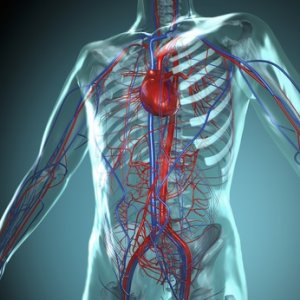 There is absolutely no reason not to consume eggs, meat, butter and other cholesterol-filled foods with a good conscience. American dietary guidelines have finally exonerated cholesterol, which happens to be an essential compound. Many scientists actually claim that atherosclerosis and cardiovascular disease are both a result of inflammation and lack of specific micronutrients. It is important to pay attention to factors that are known to promote inflammation in the body and take the necessary steps by looking after your circulatory system, making healthy lifestyle choices, and possibly even using supplements.
There is absolutely no reason not to consume eggs, meat, butter and other cholesterol-filled foods with a good conscience. American dietary guidelines have finally exonerated cholesterol, which happens to be an essential compound. Many scientists actually claim that atherosclerosis and cardiovascular disease are both a result of inflammation and lack of specific micronutrients. It is important to pay attention to factors that are known to promote inflammation in the body and take the necessary steps by looking after your circulatory system, making healthy lifestyle choices, and possibly even using supplements.
 Biotin, one of the B vitamins, is essential for numerous metabolic processes, and a biotin deficiency may be associated with inflammatory bowel disease (IBD). According to a new study that is published in Nutrients, a biotin deficiency can also have a negative impact on the intestinal flora and result in a suppression of symbiotic bacteria and a replication of harmful, dysbiotic bacteria. The scientists say that a disrupted gut flora caused by a biotin deficiency may contribute to inflammatory bowel disorders.
Biotin, one of the B vitamins, is essential for numerous metabolic processes, and a biotin deficiency may be associated with inflammatory bowel disease (IBD). According to a new study that is published in Nutrients, a biotin deficiency can also have a negative impact on the intestinal flora and result in a suppression of symbiotic bacteria and a replication of harmful, dysbiotic bacteria. The scientists say that a disrupted gut flora caused by a biotin deficiency may contribute to inflammatory bowel disorders.
 Periodontal is the leading global cause of tooth loss. It is a problem to prevent and to treat this condition because large population groups are neither able to nor used to taking proper care of their teeth and because it is expensive to see a dentist. A group of Australian scientists have decided to take a closer look at vitamin C’s role in dental health and determine how important it is to get enough vitamin C from the diet and from supplements. Another substance is important for preventing periodontal disease. You can read more about that in the article.
Periodontal is the leading global cause of tooth loss. It is a problem to prevent and to treat this condition because large population groups are neither able to nor used to taking proper care of their teeth and because it is expensive to see a dentist. A group of Australian scientists have decided to take a closer look at vitamin C’s role in dental health and determine how important it is to get enough vitamin C from the diet and from supplements. Another substance is important for preventing periodontal disease. You can read more about that in the article.
- and other inflammatory conditions
 It is hardly a coincidence that many patients with arthritis feel worse during the winter period where the sun sits too low in the sky for us humans to be able to synthesize vitamin D. In patients with rheumatoid arthritis, there is a direct link between vitamin D levels and neuropathic pain caused by irritated nerves. This was shown in a study that is published in International Journal of Rheumatic Diseases.
It is hardly a coincidence that many patients with arthritis feel worse during the winter period where the sun sits too low in the sky for us humans to be able to synthesize vitamin D. In patients with rheumatoid arthritis, there is a direct link between vitamin D levels and neuropathic pain caused by irritated nerves. This was shown in a study that is published in International Journal of Rheumatic Diseases.
 The ageing process and most chronic diseases like diabetes, cardiovascular disease, and cancer involve chronic inflammation that has the potential to damage healthy tissue. If acute hyperinflammation occurs, for example in connection with virus infections like influenza and COVID-19, the condition may become potentially life-threatening. It is therefore vital that the body can control the different inflammatory processes. One of the things that is needed for this is magnesium, according to a meta-analysis that is published in Nutrients. Here, the researchers look closer at how magnesium supplementation is able to reduce different pro-inflammatory markers. Magnesium also helps activate vitamin D, which is also necessary for controlling inflammation.
The ageing process and most chronic diseases like diabetes, cardiovascular disease, and cancer involve chronic inflammation that has the potential to damage healthy tissue. If acute hyperinflammation occurs, for example in connection with virus infections like influenza and COVID-19, the condition may become potentially life-threatening. It is therefore vital that the body can control the different inflammatory processes. One of the things that is needed for this is magnesium, according to a meta-analysis that is published in Nutrients. Here, the researchers look closer at how magnesium supplementation is able to reduce different pro-inflammatory markers. Magnesium also helps activate vitamin D, which is also necessary for controlling inflammation.
- that is involved in atherosclerosis, rheumatism, and most other chronic diseases
 Scientists from Mexico, Iran, and Australia have gathered data from several studies and focused on a certain protein that is a marker of inflammation in the body. According to the researchers, magnesium supplements can significantly reduce levels of this protein. Because magnesium deficiencies are widespread, it seems obvious to administer magnesium supplements as part of the anti-inflammatory treatment, especially because inflammation is not always easy to detect and may even set the stage for a host of other chronic diseases. It is important, however, to balance magnesium with calcium. This is a general rule both in the prevention and treatment of all chronic inflammatory conditions.
Scientists from Mexico, Iran, and Australia have gathered data from several studies and focused on a certain protein that is a marker of inflammation in the body. According to the researchers, magnesium supplements can significantly reduce levels of this protein. Because magnesium deficiencies are widespread, it seems obvious to administer magnesium supplements as part of the anti-inflammatory treatment, especially because inflammation is not always easy to detect and may even set the stage for a host of other chronic diseases. It is important, however, to balance magnesium with calcium. This is a general rule both in the prevention and treatment of all chronic inflammatory conditions.
 Magnesium is required for a well-functioning immune defense and for controlling inflammatory processes that are vital to our health. Magnesium also appears to protect against COVID-19 and other infections and the development of cancer, according to a review article published in Journal of Health, Population, and Nutrition. Our modern, refined diet, stress, ageing, stimulant abuse, and different types of medicine also contribute to the widespread problems with magnesium deficiency.
Magnesium is required for a well-functioning immune defense and for controlling inflammatory processes that are vital to our health. Magnesium also appears to protect against COVID-19 and other infections and the development of cancer, according to a review article published in Journal of Health, Population, and Nutrition. Our modern, refined diet, stress, ageing, stimulant abuse, and different types of medicine also contribute to the widespread problems with magnesium deficiency.
- here are some delicious sources
 Type 2 diabetes and early stages of the disease such as insulin resistance are spreading like a bushfire. The good news is that if you consume many antioxidants from fruit, vegetables, berries, tea, and dark chocolate and limit your intake of alcohol, you can lower your risk diabetes risk. This was shown in a new study that is published in the European journal Diabetologia, which focuses on diabetes research.
Type 2 diabetes and early stages of the disease such as insulin resistance are spreading like a bushfire. The good news is that if you consume many antioxidants from fruit, vegetables, berries, tea, and dark chocolate and limit your intake of alcohol, you can lower your risk diabetes risk. This was shown in a new study that is published in the European journal Diabetologia, which focuses on diabetes research.
 British scientists have tested whether omega-3 fatty acids from fish oil supplements have a pain-relieving effect on patients with rheumatoid arthritis. As it turns out, consuming fish oils with large quantities of EPA and DHA has the best effect, so make sure to read the label to see how much of the two omega-3 fatty acids your supplement contains. Rheumatoid arthritis and other rheumatic diseases are a result of joint inflammation, so it may also pay off to look into the benefits of an anti-inflammatory diet.
British scientists have tested whether omega-3 fatty acids from fish oil supplements have a pain-relieving effect on patients with rheumatoid arthritis. As it turns out, consuming fish oils with large quantities of EPA and DHA has the best effect, so make sure to read the label to see how much of the two omega-3 fatty acids your supplement contains. Rheumatoid arthritis and other rheumatic diseases are a result of joint inflammation, so it may also pay off to look into the benefits of an anti-inflammatory diet.
 Schizophrenia is a serious psychotic condition with delusions and hallucinations, which can be very taxing for the sufferer as well as for the rest of the family. Most people experience a slow and gradual worsening of the brain ailment, and the disease may even spread to other organs. On average, people who suffer from schizophrenia die 10 years earlier than the general population, which is why it is vital to prevent the disease or ameliorate its symptoms. Scientists have discovered that supplementing with omega-3 fatty acids has a positive effect for several reasons.
Schizophrenia is a serious psychotic condition with delusions and hallucinations, which can be very taxing for the sufferer as well as for the rest of the family. Most people experience a slow and gradual worsening of the brain ailment, and the disease may even spread to other organs. On average, people who suffer from schizophrenia die 10 years earlier than the general population, which is why it is vital to prevent the disease or ameliorate its symptoms. Scientists have discovered that supplementing with omega-3 fatty acids has a positive effect for several reasons.
 A growing number of people are affected by depression and anxiety, and there are quite a few who do not benefit from their medicine, which in some cases may even cause side effects. Earlier studies show that lack of omega-3, the essential fatty acids found primarily in oily fish, play a major role in depression. The question is how important is omega-3 for those, who already receive therapy for their depression, and what about those in therapy for anxiety? A group of Dutch scientists set out to answer this question. A thing to make a note of is that it is the two omega-3 fatty acids, EPA and DHA, which have a direct influence on our mood, and when supplementing, it may take some time before the effect is optimal.
A growing number of people are affected by depression and anxiety, and there are quite a few who do not benefit from their medicine, which in some cases may even cause side effects. Earlier studies show that lack of omega-3, the essential fatty acids found primarily in oily fish, play a major role in depression. The question is how important is omega-3 for those, who already receive therapy for their depression, and what about those in therapy for anxiety? A group of Dutch scientists set out to answer this question. A thing to make a note of is that it is the two omega-3 fatty acids, EPA and DHA, which have a direct influence on our mood, and when supplementing, it may take some time before the effect is optimal.
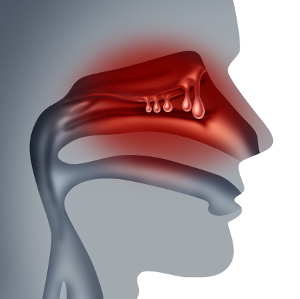 Nasal polyps are local growths that may cause runny nose, breathing difficulty, reduced sense of smell, and other symptoms. The polyps are a result of chronic inflammation that can have its roots in a number of causes. According to a new study that is published in Clinical Epidemiology and Global Health, patients with nasal polyps have lower levels of zinc in the affected tissue. Zinc is important for our immune system and for regulating inflammatory processes. Therefore, the nutrient may even have therapeutic potential because many people have relapses after their treatment. Earlier studies even suggest that patients with nasal polyps lack selenium, which is why one should also pay attention to underlying causes like respiratory allergies and food intolerance.
Nasal polyps are local growths that may cause runny nose, breathing difficulty, reduced sense of smell, and other symptoms. The polyps are a result of chronic inflammation that can have its roots in a number of causes. According to a new study that is published in Clinical Epidemiology and Global Health, patients with nasal polyps have lower levels of zinc in the affected tissue. Zinc is important for our immune system and for regulating inflammatory processes. Therefore, the nutrient may even have therapeutic potential because many people have relapses after their treatment. Earlier studies even suggest that patients with nasal polyps lack selenium, which is why one should also pay attention to underlying causes like respiratory allergies and food intolerance.
A lot of p eople take supplements of coenzyme Q10 to increase their energy levels but according to a new study the substance is even able to counteract muscle damage caused by intense physical activity.
eople take supplements of coenzyme Q10 to increase their energy levels but according to a new study the substance is even able to counteract muscle damage caused by intense physical activity.
- and oxidative stress
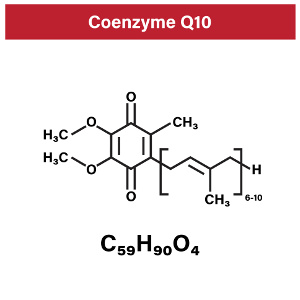 The body uses inflammation as part of its normal immune response to infections and tissue damage. If inflammation becomes chronic, however, it can be extremely dangerous. What happens is that it bombards the body with free radicals. This leads to oxidative stress and increases the risk of cell damage, overweight, and chronic diseases like type 2 diabetes, cardiovascular disease, autoimmune diseases, and different cancer forms. Diet and lifestyle play a major role, and according to a meta-analysis published in Frontiers in Pharmacology, Q10 supplementation can lower several markers of inflammation and oxidative stress.
The body uses inflammation as part of its normal immune response to infections and tissue damage. If inflammation becomes chronic, however, it can be extremely dangerous. What happens is that it bombards the body with free radicals. This leads to oxidative stress and increases the risk of cell damage, overweight, and chronic diseases like type 2 diabetes, cardiovascular disease, autoimmune diseases, and different cancer forms. Diet and lifestyle play a major role, and according to a meta-analysis published in Frontiers in Pharmacology, Q10 supplementation can lower several markers of inflammation and oxidative stress.
 A selenium deficiency may increase the risk of gluten intolerance/celiac disease, which can lead to metabolic disorders and vice versa. Because selenium deficiencies may be a result of eating a poor diet and suffering from malabsorption, this may easily turn into a vicious cycle.
A selenium deficiency may increase the risk of gluten intolerance/celiac disease, which can lead to metabolic disorders and vice versa. Because selenium deficiencies may be a result of eating a poor diet and suffering from malabsorption, this may easily turn into a vicious cycle.
- and the huge difference between the omega-3 forms ALA, EPA, and DHA
 Most people lack omega-3 fatty acids that are vital for the brain, the nervous system, and the cardiovascular system. Omega-3 fatty acids also have anti-inflammatory and cancer-fighting properties. It is important to consume omega-3 and omega-6 fatty acids in the right balance in order to benefit from their many health effects. But how do we make sure to get enough omega-3 fatty acids that we can utilize? And what is the difference between ALA, EPA, and DHA?
Most people lack omega-3 fatty acids that are vital for the brain, the nervous system, and the cardiovascular system. Omega-3 fatty acids also have anti-inflammatory and cancer-fighting properties. It is important to consume omega-3 and omega-6 fatty acids in the right balance in order to benefit from their many health effects. But how do we make sure to get enough omega-3 fatty acids that we can utilize? And what is the difference between ALA, EPA, and DHA?
 It is well-known that omega-3 fatty acids counteract inflammation, which is the common thread in most chronic diseases. A team of scientists from Tufts University in the United States has now discovered that the omega-3 fatty acids, EPA and DHA, which we get from oily fish and fish oil supplements have different anti-inflammatory mechanisms. Their study is published in the science journal Atherosclerosis and supports earlier studies that have shown how important omega-3 is for preventing circulatory diseases, rheumatism, and other lifestyle diseases.
It is well-known that omega-3 fatty acids counteract inflammation, which is the common thread in most chronic diseases. A team of scientists from Tufts University in the United States has now discovered that the omega-3 fatty acids, EPA and DHA, which we get from oily fish and fish oil supplements have different anti-inflammatory mechanisms. Their study is published in the science journal Atherosclerosis and supports earlier studies that have shown how important omega-3 is for preventing circulatory diseases, rheumatism, and other lifestyle diseases.
 Both physical traumas and critical illnesses are associated with inflammation and oxidative stress where free radicals can cause potentially life-threatening damage to cells and tissues. Traumas are estimated to be the cause of one in ten deaths. New research suggests that early intervention with selenium may shorten the hospital stay including the days spent in intensive care and reduce total mortality. This was shown in a study published in Frontiers in Nutrition where the researchers looked closer at selenium’s unique antioxidant properties and anti-inflammatory effect.
Both physical traumas and critical illnesses are associated with inflammation and oxidative stress where free radicals can cause potentially life-threatening damage to cells and tissues. Traumas are estimated to be the cause of one in ten deaths. New research suggests that early intervention with selenium may shorten the hospital stay including the days spent in intensive care and reduce total mortality. This was shown in a study published in Frontiers in Nutrition where the researchers looked closer at selenium’s unique antioxidant properties and anti-inflammatory effect.
- that can often be remedied with simple diet changes and specific supplements
 The number of Danes suffering from one or several chronic diseases is a lot higher than previously thought, according to a group of scientists behind a new study from Danish Center for Healthcare Improvement at Aalborg University. Diseases such as hypertension, elevated cholesterol, depression, bronchitis, asthma, type 2 diabetes, rheumatism, and osteoporosis are among the most widespread ailments. Although there may be a reason of underlying factors, diet and lack of essential nutrients often play a key role. This is something that we have written about over the years on this website, and we have tried to gather some facts from various articles. Simple diet changes and the use of relevant nutritional supplements may play a key role in the treatment of these chronic ailments that come at a huge price, both to the individual sufferer and to society.
The number of Danes suffering from one or several chronic diseases is a lot higher than previously thought, according to a group of scientists behind a new study from Danish Center for Healthcare Improvement at Aalborg University. Diseases such as hypertension, elevated cholesterol, depression, bronchitis, asthma, type 2 diabetes, rheumatism, and osteoporosis are among the most widespread ailments. Although there may be a reason of underlying factors, diet and lack of essential nutrients often play a key role. This is something that we have written about over the years on this website, and we have tried to gather some facts from various articles. Simple diet changes and the use of relevant nutritional supplements may play a key role in the treatment of these chronic ailments that come at a huge price, both to the individual sufferer and to society.
 In connection with tissue lesions, vitamin B12 boosts cellular reprogramming to speed up the healing process. This was shown in a Spanish study of mice with ulcerous colitis (bleeding inflammation in the colon). Based on this, the researchers assume that vitamin B12 supplementation may be useful for speeding up the regeneration of damage intestinal tissue. They mention that vitamin B12 may also help reduce the type of complicated inflammation that is seen with ulcerous colitis, and which contributes to the destruction of the intestinal mucosa. In this connection, it is important to remember that vegan diets lack vitamin B12, and that weak stomach acid and the ageing process can also inhibit the absorption of the nutrient.
In connection with tissue lesions, vitamin B12 boosts cellular reprogramming to speed up the healing process. This was shown in a Spanish study of mice with ulcerous colitis (bleeding inflammation in the colon). Based on this, the researchers assume that vitamin B12 supplementation may be useful for speeding up the regeneration of damage intestinal tissue. They mention that vitamin B12 may also help reduce the type of complicated inflammation that is seen with ulcerous colitis, and which contributes to the destruction of the intestinal mucosa. In this connection, it is important to remember that vegan diets lack vitamin B12, and that weak stomach acid and the ageing process can also inhibit the absorption of the nutrient.
 More vitamin D may contribute to better blood sugar regulation in type 2 diabetes. Eggs are a good source of vitamin D, but in the winter period it may be a good idea to take a high-dosed supplement.
More vitamin D may contribute to better blood sugar regulation in type 2 diabetes. Eggs are a good source of vitamin D, but in the winter period it may be a good idea to take a high-dosed supplement.
 Lack of vitamin D is rather common and is associated with a host of diseases that affect the teeth and gums. In children, a vitamin D deficiency may result in fragile teeth with weak enamel and an increased risk of cavities. Later in life, the vitamin deficiency may also increase the risk of periodontal disease and certain types of oral cancer, according to an article that is published in the scientific journal Nutrients. The authors refer to a number of clinical studies that point to vitamin D’s different functions with regard to dental health. Also, they mention that vitamin D deficiencies are widespread and write that it may be necessary to take a supplement for proper dental health.
Lack of vitamin D is rather common and is associated with a host of diseases that affect the teeth and gums. In children, a vitamin D deficiency may result in fragile teeth with weak enamel and an increased risk of cavities. Later in life, the vitamin deficiency may also increase the risk of periodontal disease and certain types of oral cancer, according to an article that is published in the scientific journal Nutrients. The authors refer to a number of clinical studies that point to vitamin D’s different functions with regard to dental health. Also, they mention that vitamin D deficiencies are widespread and write that it may be necessary to take a supplement for proper dental health.
 According to WHO, the number of overweight children has reached epidemic proportions. Overweight children risk being overweight as adults and develop hypertension, cardiovascular disease, type 2 diabetes, chronic inflammation, and other metabolic disturbances. Apparently, overweight individuals often lack vitamin D, a nutrient that is important for regulating weight, inflammation, and many metabolic processes. This was pointed out in an Italian study published in Nutrients, where the authors address vitamin D’s role in health and explain why so many overweight people are vitamin D-deficient.
According to WHO, the number of overweight children has reached epidemic proportions. Overweight children risk being overweight as adults and develop hypertension, cardiovascular disease, type 2 diabetes, chronic inflammation, and other metabolic disturbances. Apparently, overweight individuals often lack vitamin D, a nutrient that is important for regulating weight, inflammation, and many metabolic processes. This was pointed out in an Italian study published in Nutrients, where the authors address vitamin D’s role in health and explain why so many overweight people are vitamin D-deficient.
 According to a study that was presented to a group of endocrinologists at an Edinburgh conference, supplements of vitamin D may improve sports performance and reduce the risk of cardiovascular disease. One of the things vitamin D does is to block the stress hormone cortisol that makes your blood pressure go up. The problem is that many people lack vitamin D, not only in the winter time but even during the summer period.
According to a study that was presented to a group of endocrinologists at an Edinburgh conference, supplements of vitamin D may improve sports performance and reduce the risk of cardiovascular disease. One of the things vitamin D does is to block the stress hormone cortisol that makes your blood pressure go up. The problem is that many people lack vitamin D, not only in the winter time but even during the summer period.
- which is involved in asthma, rheumatoid arthritis and most chronic diseases
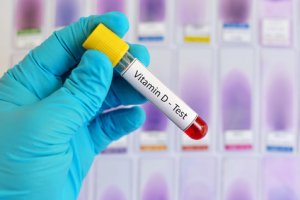 This time of year, many people suffer from asthma, aching joints, or an exacerbation of other chronic diseases that involve inflammation. This is often because they lack vitamin D, as the sun sits too low in the sky for us humans to be able to synthesize the vitamin. Also, the diet and normal vitamin pills only provide minimal amounts vitamin D. It has been known for a long time that vitamin D counteracts inflammation. Now, a large systematic study is planned to investigate how supplementing with large quantities of vitamin D can affect the molecular mechanisms that counteract inflammation.
This time of year, many people suffer from asthma, aching joints, or an exacerbation of other chronic diseases that involve inflammation. This is often because they lack vitamin D, as the sun sits too low in the sky for us humans to be able to synthesize the vitamin. Also, the diet and normal vitamin pills only provide minimal amounts vitamin D. It has been known for a long time that vitamin D counteracts inflammation. Now, a large systematic study is planned to investigate how supplementing with large quantities of vitamin D can affect the molecular mechanisms that counteract inflammation.
 PMS (premenstrual syndrome) is quite common among women of childbearing age and can easily make their lives miserable for years, causing both physical and mental discomfort several days a month. A possible cause can be lack of vitamin D, and it looks as if high-dosed supplementation with the nutrient can relieve PMS by controlling inflammation markers and influencing the body’s antioxidant capacity. This was shown in an Iranian study that is published in Scientific Reports. It is worth noting that we need magnesium to activate vitamin D in order for the body to be able to use it optimally.
PMS (premenstrual syndrome) is quite common among women of childbearing age and can easily make their lives miserable for years, causing both physical and mental discomfort several days a month. A possible cause can be lack of vitamin D, and it looks as if high-dosed supplementation with the nutrient can relieve PMS by controlling inflammation markers and influencing the body’s antioxidant capacity. This was shown in an Iranian study that is published in Scientific Reports. It is worth noting that we need magnesium to activate vitamin D in order for the body to be able to use it optimally.
 According to a Cochrane review, supplementing asthma medication with vitamin D may halve the risk of having a severe asthma attack and improve quality of life for those who suffer from this condition.
According to a Cochrane review, supplementing asthma medication with vitamin D may halve the risk of having a severe asthma attack and improve quality of life for those who suffer from this condition.
 According to WHO, chronic inflammation is the leading cause of death worldwide. Although it is not something that can be felt as such, chronic inflammation sets the stage for a host of different diseases. In a new review article that is published in StatPearls, the authors look closer at why chronic inflammation is so dangerous and how a healthier lifestyle with vitamin D, selenium, magnesium, zinc, and fish oil can help fight the inflammation and prevent the many different diseases and early death that follow in its wake.
According to WHO, chronic inflammation is the leading cause of death worldwide. Although it is not something that can be felt as such, chronic inflammation sets the stage for a host of different diseases. In a new review article that is published in StatPearls, the authors look closer at why chronic inflammation is so dangerous and how a healthier lifestyle with vitamin D, selenium, magnesium, zinc, and fish oil can help fight the inflammation and prevent the many different diseases and early death that follow in its wake.
 Zinc strengthens the immune defense and controls inflammatory conditions such as eczema. According to a Finnish meta-analysis, high-dosed zinc supplements can help the immune defense fight a regular cold much faster. It turns out that there are widespread zinc deficiencies. First of all, sugar, birth control pills, inorganic iron supplements, and normal ageing processes impair the body’s zinc uptake. Secondly, it may be difficult to get enough zinc if you are on a vegetarian or vegan diet. Not only does a zinc deficiency have a negative effect on your immune defense and skin health, it also upsets the countless enzymatic processes in which zinc is involved.
Zinc strengthens the immune defense and controls inflammatory conditions such as eczema. According to a Finnish meta-analysis, high-dosed zinc supplements can help the immune defense fight a regular cold much faster. It turns out that there are widespread zinc deficiencies. First of all, sugar, birth control pills, inorganic iron supplements, and normal ageing processes impair the body’s zinc uptake. Secondly, it may be difficult to get enough zinc if you are on a vegetarian or vegan diet. Not only does a zinc deficiency have a negative effect on your immune defense and skin health, it also upsets the countless enzymatic processes in which zinc is involved.
 The mineral zinc has demonstrated a surprising ability to help the liver fight virus infections and prevent tissue damage caused by chronic liver diseases. By regulating a specific protein, zinc both strengthens the immune defense and counteracts undesirable inflammation. This was shown in a new Australian study headed by scientists from Westmead Institute for Medical Research.
The mineral zinc has demonstrated a surprising ability to help the liver fight virus infections and prevent tissue damage caused by chronic liver diseases. By regulating a specific protein, zinc both strengthens the immune defense and counteracts undesirable inflammation. This was shown in a new Australian study headed by scientists from Westmead Institute for Medical Research.
It also turns out that minor to moderate zinc deficiencies are rather common. Most importantly, sugar, birth control pills, inorganic iron supplements, and ageing processes impair the body’s ability to absorb zinc. Moreover, it is often difficult to get enough zinc from vegetarian and vegan diets. Being zinc-deficient takes its toll on the immune system and the liver, but also has a negative impact on the countless enzyme processes that involve zinc.
 The majority of chronic ailments, including autoimmune diseases like rheumatoid arthritis, depression, Alzheimer’s disease, diabetes, and cancer, involve inflammation. Science has known for a long time that omega-3 fatty acids counteract inflammation. A study from the University of Illinois, USA, shows that the process is controlled by cannabinoids, which the body itself can produce but are also found in cannabis oil. In other words, it is possible to activate the body’s cannabinoid receptors in the immune system and nervous system by means of large quantities of fish oil, which contains the most active forms of omega-3.
The majority of chronic ailments, including autoimmune diseases like rheumatoid arthritis, depression, Alzheimer’s disease, diabetes, and cancer, involve inflammation. Science has known for a long time that omega-3 fatty acids counteract inflammation. A study from the University of Illinois, USA, shows that the process is controlled by cannabinoids, which the body itself can produce but are also found in cannabis oil. In other words, it is possible to activate the body’s cannabinoid receptors in the immune system and nervous system by means of large quantities of fish oil, which contains the most active forms of omega-3.







 Magnesium is important for numerous physiological functions. In a new review article published in Nutrients, researchers have looked at the relation between the body’s magnesium levels and a variety of different ageing markers. Also, they hypothesize that optimal intake of magnesium throughout life is an easy and inexpensive way to obtain healthy ageing.
Magnesium is important for numerous physiological functions. In a new review article published in Nutrients, researchers have looked at the relation between the body’s magnesium levels and a variety of different ageing markers. Also, they hypothesize that optimal intake of magnesium throughout life is an easy and inexpensive way to obtain healthy ageing.


 Taking a supplement of vitamin D in combination with your prescription asthma medicine may halve your risk of an asthma attack that would require hospitalization, according to a new meta-analysis from Queen Mary University in London (QMUL). A vitamin D deficiency alone, which is rather common at northern latitudes, can increase the risk of asthma. Therefore, it is vital to make sure to have sufficiently high levels of this nutrient all year round to protect your respiratory tract.
Taking a supplement of vitamin D in combination with your prescription asthma medicine may halve your risk of an asthma attack that would require hospitalization, according to a new meta-analysis from Queen Mary University in London (QMUL). A vitamin D deficiency alone, which is rather common at northern latitudes, can increase the risk of asthma. Therefore, it is vital to make sure to have sufficiently high levels of this nutrient all year round to protect your respiratory tract. Vitamin C is essential for the immune defense for a number of reasons. According to a review of 12 recent studies, vitamin C administered in sufficiently high doses can prevent severe COVID-19 infections and save lives. The problem is that most people fail to follow the official dietary guidelines for fruit and vegetable consumption, which is why so many people lack vitamin C. Another thing is that health authorities in general are unaware of the health benefits of vitamin C in therapeutic doses, even after 80 years of international research.
Vitamin C is essential for the immune defense for a number of reasons. According to a review of 12 recent studies, vitamin C administered in sufficiently high doses can prevent severe COVID-19 infections and save lives. The problem is that most people fail to follow the official dietary guidelines for fruit and vegetable consumption, which is why so many people lack vitamin C. Another thing is that health authorities in general are unaware of the health benefits of vitamin C in therapeutic doses, even after 80 years of international research.
 According to Bruce Ames, an American biochemist, ageing processes are largely due to lack of nutrients. One important contributing factor is the fact that our uptake and utilization of vitamins and minerals decrease with age. In addition, a lot of different types of medicine block our ability to utilize different nutrients. As a result of this, many of our enzyme processes slow down, making our cells increasingly vulnerable and that increases our risk of disease. Nonetheless, there is a lot we can do to optimize our intake and utilization of nutrients, particularly with respect to vitamin B12, vitamin D, calcium, iron, selenium, and zinc. It is also worth taking a look at Q10 for energy turnover and melatonin for healthy sleep. Our endogenous synthesis of both compounds decreases with age.
According to Bruce Ames, an American biochemist, ageing processes are largely due to lack of nutrients. One important contributing factor is the fact that our uptake and utilization of vitamins and minerals decrease with age. In addition, a lot of different types of medicine block our ability to utilize different nutrients. As a result of this, many of our enzyme processes slow down, making our cells increasingly vulnerable and that increases our risk of disease. Nonetheless, there is a lot we can do to optimize our intake and utilization of nutrients, particularly with respect to vitamin B12, vitamin D, calcium, iron, selenium, and zinc. It is also worth taking a look at Q10 for energy turnover and melatonin for healthy sleep. Our endogenous synthesis of both compounds decreases with age. Every day, the intestinal immune system has to defend itself against hordes of microbes and toxins. If it fails to function optimally, there is an increased risk of infections, allergies, and inflammatory diseases. More and more research reveals that essential nutrients help to control the intestinal immune defense. Also, new research shows how important a well-functioning immune system is for our digestion and health in general. This article takes a closer look at the vitamins that are known to be particularly important for the intestinal immune system. Another thing that is vital is to have adequate amounts of gastric juice.
Every day, the intestinal immune system has to defend itself against hordes of microbes and toxins. If it fails to function optimally, there is an increased risk of infections, allergies, and inflammatory diseases. More and more research reveals that essential nutrients help to control the intestinal immune defense. Also, new research shows how important a well-functioning immune system is for our digestion and health in general. This article takes a closer look at the vitamins that are known to be particularly important for the intestinal immune system. Another thing that is vital is to have adequate amounts of gastric juice. Chronic low-grade inflammation has a negative effect on our health. It pummels the body with free radical damage to healthy cells and tissue. Chronic low-grade inflammation is linked to ageing, overweight, type 2 diabetes, cardiovascular disease, and other health problems. In the case of infections, there is also a risk that the immune defense overreacts with hyperinflammation, which can turn out to be very problematic. Now, science has discovered that our gut flora also affects the immune system. Some gut bacteria have a pro-inflammatory effect, while others help fight inflammation. Fish oil’s anti-inflammatory effect involves other mechanisms. Supplements of beneficial gut bacteria, better known as probiotics, and fish oil supplements help increase gut flora diversity. This is good for fighting inflammation, according to a new study published in Nutrients. Another thing to make sure of is to get enough vitamin D.
Chronic low-grade inflammation has a negative effect on our health. It pummels the body with free radical damage to healthy cells and tissue. Chronic low-grade inflammation is linked to ageing, overweight, type 2 diabetes, cardiovascular disease, and other health problems. In the case of infections, there is also a risk that the immune defense overreacts with hyperinflammation, which can turn out to be very problematic. Now, science has discovered that our gut flora also affects the immune system. Some gut bacteria have a pro-inflammatory effect, while others help fight inflammation. Fish oil’s anti-inflammatory effect involves other mechanisms. Supplements of beneficial gut bacteria, better known as probiotics, and fish oil supplements help increase gut flora diversity. This is good for fighting inflammation, according to a new study published in Nutrients. Another thing to make sure of is to get enough vitamin D. The number of seniors in the world is growing steadily which means a surge in problems like cardiovascular disease, cancer, respiratory illnesses, overweight, diabetes, rheumatism, dementia, and Alzheimer’s disease. These diseases that have a widespread impact on human lives and are a burden to society are often linked to chronic inflammation. A group of scientists therefore decided to look closer at studies that have found a positive effect of the omega-3 fatty acids EPA and DHA on cognitive functioning, maintenance of muscle mass, and prevention and treatment of a host of serious diseases that are related to ageing. It is vital to start supplementing early and to take the right doses, according to the new review article published in Nutrients.
The number of seniors in the world is growing steadily which means a surge in problems like cardiovascular disease, cancer, respiratory illnesses, overweight, diabetes, rheumatism, dementia, and Alzheimer’s disease. These diseases that have a widespread impact on human lives and are a burden to society are often linked to chronic inflammation. A group of scientists therefore decided to look closer at studies that have found a positive effect of the omega-3 fatty acids EPA and DHA on cognitive functioning, maintenance of muscle mass, and prevention and treatment of a host of serious diseases that are related to ageing. It is vital to start supplementing early and to take the right doses, according to the new review article published in Nutrients.
 There is widespread potassium deficiency, and it is common knowledge that an increased potassium intake lowers the risk of hypertension, which is the leading cause of stroke, cardiovascular disease, and early death. However, not many people know that potassium has a vital impact on blood sugar levels and the prevention of diabetes, just as it counteracts side effects of diuretics. The question is how much potassium do we need – and how does the balance between potassium and sodium (salt) affect our health?
There is widespread potassium deficiency, and it is common knowledge that an increased potassium intake lowers the risk of hypertension, which is the leading cause of stroke, cardiovascular disease, and early death. However, not many people know that potassium has a vital impact on blood sugar levels and the prevention of diabetes, just as it counteracts side effects of diuretics. The question is how much potassium do we need – and how does the balance between potassium and sodium (salt) affect our health? Ageing is linked to uncontrolled, low-grade inflammation, also known as inflammaging, according to articles published in the journals Nature Medicine and Ageing and Disease. Although chronic inflammation is not felt directly it may set the stage for cardiovascular disease, rheumatism, Alzheimer’s disease, and cancer. Chronic inflammation may also cause virus infections like influenza and COVID-19 to become life-threatening because the immune defense suddenly overreacts and attacks healthy tissue. It is therefore vital for ageing people to protect themselves against chronic inflammation, which means getting plenty of vitamin D, selenium, coenzyme Q10, zinc, omega-3, and melatonin. These are all things that many older people often lack.
Ageing is linked to uncontrolled, low-grade inflammation, also known as inflammaging, according to articles published in the journals Nature Medicine and Ageing and Disease. Although chronic inflammation is not felt directly it may set the stage for cardiovascular disease, rheumatism, Alzheimer’s disease, and cancer. Chronic inflammation may also cause virus infections like influenza and COVID-19 to become life-threatening because the immune defense suddenly overreacts and attacks healthy tissue. It is therefore vital for ageing people to protect themselves against chronic inflammation, which means getting plenty of vitamin D, selenium, coenzyme Q10, zinc, omega-3, and melatonin. These are all things that many older people often lack. Critically ill patients often suffer from inflammation and oxidative stress, which is an imbalance between harmful free radicals and protective antioxidants. In worst case, this may result in tissue damage and organ failure. It turns out vitamin C is a powerful antioxidant with a therapeutic potential. According to a new systematic review article and meta-analysis, therapy with large quantities of intravenous vitamin C helps shorten the duration of the hospital stay for critically ill patients without any side effects.
Critically ill patients often suffer from inflammation and oxidative stress, which is an imbalance between harmful free radicals and protective antioxidants. In worst case, this may result in tissue damage and organ failure. It turns out vitamin C is a powerful antioxidant with a therapeutic potential. According to a new systematic review article and meta-analysis, therapy with large quantities of intravenous vitamin C helps shorten the duration of the hospital stay for critically ill patients without any side effects. There is absolutely no reason not to consume eggs, meat, butter and other cholesterol-filled foods with a good conscience. American dietary guidelines have finally exonerated cholesterol, which happens to be an essential compound. Many scientists actually claim that atherosclerosis and cardiovascular disease are both a result of inflammation and lack of specific micronutrients. It is important to pay attention to factors that are known to promote inflammation in the body and take the necessary steps by looking after your circulatory system, making healthy lifestyle choices, and possibly even using supplements.
There is absolutely no reason not to consume eggs, meat, butter and other cholesterol-filled foods with a good conscience. American dietary guidelines have finally exonerated cholesterol, which happens to be an essential compound. Many scientists actually claim that atherosclerosis and cardiovascular disease are both a result of inflammation and lack of specific micronutrients. It is important to pay attention to factors that are known to promote inflammation in the body and take the necessary steps by looking after your circulatory system, making healthy lifestyle choices, and possibly even using supplements. Biotin, one of the B vitamins, is essential for numerous metabolic processes, and a biotin deficiency may be associated with inflammatory bowel disease (IBD). According to a new study that is published in Nutrients, a biotin deficiency can also have a negative impact on the intestinal flora and result in a suppression of symbiotic bacteria and a replication of harmful, dysbiotic bacteria. The scientists say that a disrupted gut flora caused by a biotin deficiency may contribute to inflammatory bowel disorders.
Biotin, one of the B vitamins, is essential for numerous metabolic processes, and a biotin deficiency may be associated with inflammatory bowel disease (IBD). According to a new study that is published in Nutrients, a biotin deficiency can also have a negative impact on the intestinal flora and result in a suppression of symbiotic bacteria and a replication of harmful, dysbiotic bacteria. The scientists say that a disrupted gut flora caused by a biotin deficiency may contribute to inflammatory bowel disorders. Periodontal is the leading global cause of tooth loss. It is a problem to prevent and to treat this condition because large population groups are neither able to nor used to taking proper care of their teeth and because it is expensive to see a dentist. A group of Australian scientists have decided to take a closer look at vitamin C’s role in dental health and determine how important it is to get enough vitamin C from the diet and from supplements. Another substance is important for preventing periodontal disease. You can read more about that in the article.
Periodontal is the leading global cause of tooth loss. It is a problem to prevent and to treat this condition because large population groups are neither able to nor used to taking proper care of their teeth and because it is expensive to see a dentist. A group of Australian scientists have decided to take a closer look at vitamin C’s role in dental health and determine how important it is to get enough vitamin C from the diet and from supplements. Another substance is important for preventing periodontal disease. You can read more about that in the article. It is hardly a coincidence that many patients with arthritis feel worse during the winter period where the sun sits too low in the sky for us humans to be able to synthesize vitamin D. In patients with rheumatoid arthritis, there is a direct link between vitamin D levels and neuropathic pain caused by irritated nerves. This was shown in a study that is published in International Journal of Rheumatic Diseases.
It is hardly a coincidence that many patients with arthritis feel worse during the winter period where the sun sits too low in the sky for us humans to be able to synthesize vitamin D. In patients with rheumatoid arthritis, there is a direct link between vitamin D levels and neuropathic pain caused by irritated nerves. This was shown in a study that is published in International Journal of Rheumatic Diseases. The ageing process and most chronic diseases like diabetes, cardiovascular disease, and cancer involve chronic inflammation that has the potential to damage healthy tissue. If acute hyperinflammation occurs, for example in connection with virus infections like influenza and COVID-19, the condition may become potentially life-threatening. It is therefore vital that the body can control the different inflammatory processes. One of the things that is needed for this is magnesium, according to a meta-analysis that is published in Nutrients. Here, the researchers look closer at how magnesium supplementation is able to reduce different pro-inflammatory markers. Magnesium also helps activate vitamin D, which is also necessary for controlling inflammation.
The ageing process and most chronic diseases like diabetes, cardiovascular disease, and cancer involve chronic inflammation that has the potential to damage healthy tissue. If acute hyperinflammation occurs, for example in connection with virus infections like influenza and COVID-19, the condition may become potentially life-threatening. It is therefore vital that the body can control the different inflammatory processes. One of the things that is needed for this is magnesium, according to a meta-analysis that is published in Nutrients. Here, the researchers look closer at how magnesium supplementation is able to reduce different pro-inflammatory markers. Magnesium also helps activate vitamin D, which is also necessary for controlling inflammation. Scientists from Mexico, Iran, and Australia have gathered data from several studies and focused on a certain protein that is a marker of inflammation in the body. According to the researchers, magnesium supplements can significantly reduce levels of this protein. Because magnesium deficiencies are widespread, it seems obvious to administer magnesium supplements as part of the anti-inflammatory treatment, especially because inflammation is not always easy to detect and may even set the stage for a host of other chronic diseases. It is important, however, to balance magnesium with calcium. This is a general rule both in the prevention and treatment of all chronic inflammatory conditions.
Scientists from Mexico, Iran, and Australia have gathered data from several studies and focused on a certain protein that is a marker of inflammation in the body. According to the researchers, magnesium supplements can significantly reduce levels of this protein. Because magnesium deficiencies are widespread, it seems obvious to administer magnesium supplements as part of the anti-inflammatory treatment, especially because inflammation is not always easy to detect and may even set the stage for a host of other chronic diseases. It is important, however, to balance magnesium with calcium. This is a general rule both in the prevention and treatment of all chronic inflammatory conditions. Magnesium is required for a well-functioning immune defense and for controlling inflammatory processes that are vital to our health. Magnesium also appears to protect against COVID-19 and other infections and the development of cancer, according to a review article published in Journal of Health, Population, and Nutrition. Our modern, refined diet, stress, ageing, stimulant abuse, and different types of medicine also contribute to the widespread problems with magnesium deficiency.
Magnesium is required for a well-functioning immune defense and for controlling inflammatory processes that are vital to our health. Magnesium also appears to protect against COVID-19 and other infections and the development of cancer, according to a review article published in Journal of Health, Population, and Nutrition. Our modern, refined diet, stress, ageing, stimulant abuse, and different types of medicine also contribute to the widespread problems with magnesium deficiency. Type 2 diabetes and early stages of the disease such as insulin resistance are spreading like a bushfire. The good news is that if you consume many antioxidants from fruit, vegetables, berries, tea, and dark chocolate and limit your intake of alcohol, you can lower your risk diabetes risk. This was shown in a new study that is published in the European journal Diabetologia, which focuses on diabetes research.
Type 2 diabetes and early stages of the disease such as insulin resistance are spreading like a bushfire. The good news is that if you consume many antioxidants from fruit, vegetables, berries, tea, and dark chocolate and limit your intake of alcohol, you can lower your risk diabetes risk. This was shown in a new study that is published in the European journal Diabetologia, which focuses on diabetes research. British scientists have tested whether omega-3 fatty acids from fish oil supplements have a pain-relieving effect on patients with rheumatoid arthritis. As it turns out, consuming fish oils with large quantities of EPA and DHA has the best effect, so make sure to read the label to see how much of the two omega-3 fatty acids your supplement contains. Rheumatoid arthritis and other rheumatic diseases are a result of joint inflammation, so it may also pay off to look into the benefits of an anti-inflammatory diet.
British scientists have tested whether omega-3 fatty acids from fish oil supplements have a pain-relieving effect on patients with rheumatoid arthritis. As it turns out, consuming fish oils with large quantities of EPA and DHA has the best effect, so make sure to read the label to see how much of the two omega-3 fatty acids your supplement contains. Rheumatoid arthritis and other rheumatic diseases are a result of joint inflammation, so it may also pay off to look into the benefits of an anti-inflammatory diet. Schizophrenia is a serious psychotic condition with delusions and hallucinations, which can be very taxing for the sufferer as well as for the rest of the family. Most people experience a slow and gradual worsening of the brain ailment, and the disease may even spread to other organs. On average, people who suffer from schizophrenia die 10 years earlier than the general population, which is why it is vital to prevent the disease or ameliorate its symptoms. Scientists have discovered that supplementing with omega-3 fatty acids has a positive effect for several reasons.
Schizophrenia is a serious psychotic condition with delusions and hallucinations, which can be very taxing for the sufferer as well as for the rest of the family. Most people experience a slow and gradual worsening of the brain ailment, and the disease may even spread to other organs. On average, people who suffer from schizophrenia die 10 years earlier than the general population, which is why it is vital to prevent the disease or ameliorate its symptoms. Scientists have discovered that supplementing with omega-3 fatty acids has a positive effect for several reasons. A growing number of people are affected by depression and anxiety, and there are quite a few who do not benefit from their medicine, which in some cases may even cause side effects. Earlier studies show that lack of omega-3, the essential fatty acids found primarily in oily fish, play a major role in depression. The question is how important is omega-3 for those, who already receive therapy for their depression, and what about those in therapy for anxiety? A group of Dutch scientists set out to answer this question. A thing to make a note of is that it is the two omega-3 fatty acids, EPA and DHA, which have a direct influence on our mood, and when supplementing, it may take some time before the effect is optimal.
A growing number of people are affected by depression and anxiety, and there are quite a few who do not benefit from their medicine, which in some cases may even cause side effects. Earlier studies show that lack of omega-3, the essential fatty acids found primarily in oily fish, play a major role in depression. The question is how important is omega-3 for those, who already receive therapy for their depression, and what about those in therapy for anxiety? A group of Dutch scientists set out to answer this question. A thing to make a note of is that it is the two omega-3 fatty acids, EPA and DHA, which have a direct influence on our mood, and when supplementing, it may take some time before the effect is optimal. Nasal polyps are local growths that may cause runny nose, breathing difficulty, reduced sense of smell, and other symptoms. The polyps are a result of chronic inflammation that can have its roots in a number of causes. According to a new study that is published in Clinical Epidemiology and Global Health, patients with nasal polyps have lower levels of zinc in the affected tissue. Zinc is important for our immune system and for regulating inflammatory processes. Therefore, the nutrient may even have therapeutic potential because many people have relapses after their treatment. Earlier studies even suggest that patients with nasal polyps lack selenium, which is why one should also pay attention to underlying causes like respiratory allergies and food intolerance.
Nasal polyps are local growths that may cause runny nose, breathing difficulty, reduced sense of smell, and other symptoms. The polyps are a result of chronic inflammation that can have its roots in a number of causes. According to a new study that is published in Clinical Epidemiology and Global Health, patients with nasal polyps have lower levels of zinc in the affected tissue. Zinc is important for our immune system and for regulating inflammatory processes. Therefore, the nutrient may even have therapeutic potential because many people have relapses after their treatment. Earlier studies even suggest that patients with nasal polyps lack selenium, which is why one should also pay attention to underlying causes like respiratory allergies and food intolerance. eople take supplements of coenzyme Q10 to increase their energy levels but according to a new study the substance is even able to counteract muscle damage caused by intense physical activity.
eople take supplements of coenzyme Q10 to increase their energy levels but according to a new study the substance is even able to counteract muscle damage caused by intense physical activity. The body uses inflammation as part of its normal immune response to infections and tissue damage. If inflammation becomes chronic, however, it can be extremely dangerous. What happens is that it bombards the body with free radicals. This leads to oxidative stress and increases the risk of cell damage, overweight, and chronic diseases like type 2 diabetes, cardiovascular disease, autoimmune diseases, and different cancer forms. Diet and lifestyle play a major role, and according to a meta-analysis published in Frontiers in Pharmacology, Q10 supplementation can lower several markers of inflammation and oxidative stress.
The body uses inflammation as part of its normal immune response to infections and tissue damage. If inflammation becomes chronic, however, it can be extremely dangerous. What happens is that it bombards the body with free radicals. This leads to oxidative stress and increases the risk of cell damage, overweight, and chronic diseases like type 2 diabetes, cardiovascular disease, autoimmune diseases, and different cancer forms. Diet and lifestyle play a major role, and according to a meta-analysis published in Frontiers in Pharmacology, Q10 supplementation can lower several markers of inflammation and oxidative stress. A selenium deficiency may increase the risk of gluten intolerance/celiac disease, which can lead to metabolic disorders and vice versa. Because selenium deficiencies may be a result of eating a poor diet and suffering from malabsorption, this may easily turn into a vicious cycle.
A selenium deficiency may increase the risk of gluten intolerance/celiac disease, which can lead to metabolic disorders and vice versa. Because selenium deficiencies may be a result of eating a poor diet and suffering from malabsorption, this may easily turn into a vicious cycle. Most people lack omega-3 fatty acids that are vital for the brain, the nervous system, and the cardiovascular system. Omega-3 fatty acids also have anti-inflammatory and cancer-fighting properties. It is important to consume omega-3 and omega-6 fatty acids in the right balance in order to benefit from their many health effects. But how do we make sure to get enough omega-3 fatty acids that we can utilize? And what is the difference between ALA, EPA, and DHA?
Most people lack omega-3 fatty acids that are vital for the brain, the nervous system, and the cardiovascular system. Omega-3 fatty acids also have anti-inflammatory and cancer-fighting properties. It is important to consume omega-3 and omega-6 fatty acids in the right balance in order to benefit from their many health effects. But how do we make sure to get enough omega-3 fatty acids that we can utilize? And what is the difference between ALA, EPA, and DHA? It is well-known that omega-3 fatty acids counteract inflammation, which is the common thread in most chronic diseases. A team of scientists from Tufts University in the United States has now discovered that the omega-3 fatty acids, EPA and DHA, which we get from oily fish and fish oil supplements have different anti-inflammatory mechanisms. Their study is published in the science journal Atherosclerosis and supports earlier studies that have shown how important omega-3 is for preventing circulatory diseases, rheumatism, and other lifestyle diseases.
It is well-known that omega-3 fatty acids counteract inflammation, which is the common thread in most chronic diseases. A team of scientists from Tufts University in the United States has now discovered that the omega-3 fatty acids, EPA and DHA, which we get from oily fish and fish oil supplements have different anti-inflammatory mechanisms. Their study is published in the science journal Atherosclerosis and supports earlier studies that have shown how important omega-3 is for preventing circulatory diseases, rheumatism, and other lifestyle diseases. Both physical traumas and critical illnesses are associated with inflammation and oxidative stress where free radicals can cause potentially life-threatening damage to cells and tissues. Traumas are estimated to be the cause of one in ten deaths. New research suggests that early intervention with selenium may shorten the hospital stay including the days spent in intensive care and reduce total mortality. This was shown in a study published in Frontiers in Nutrition where the researchers looked closer at selenium’s unique antioxidant properties and anti-inflammatory effect.
Both physical traumas and critical illnesses are associated with inflammation and oxidative stress where free radicals can cause potentially life-threatening damage to cells and tissues. Traumas are estimated to be the cause of one in ten deaths. New research suggests that early intervention with selenium may shorten the hospital stay including the days spent in intensive care and reduce total mortality. This was shown in a study published in Frontiers in Nutrition where the researchers looked closer at selenium’s unique antioxidant properties and anti-inflammatory effect. The number of Danes suffering from one or several chronic diseases is a lot higher than previously thought, according to a group of scientists behind a new study from Danish Center for Healthcare Improvement at Aalborg University. Diseases such as hypertension, elevated cholesterol, depression, bronchitis, asthma, type 2 diabetes, rheumatism, and osteoporosis are among the most widespread ailments. Although there may be a reason of underlying factors, diet and lack of essential nutrients often play a key role. This is something that we have written about over the years on this website, and we have tried to gather some facts from various articles. Simple diet changes and the use of relevant nutritional supplements may play a key role in the treatment of these chronic ailments that come at a huge price, both to the individual sufferer and to society.
The number of Danes suffering from one or several chronic diseases is a lot higher than previously thought, according to a group of scientists behind a new study from Danish Center for Healthcare Improvement at Aalborg University. Diseases such as hypertension, elevated cholesterol, depression, bronchitis, asthma, type 2 diabetes, rheumatism, and osteoporosis are among the most widespread ailments. Although there may be a reason of underlying factors, diet and lack of essential nutrients often play a key role. This is something that we have written about over the years on this website, and we have tried to gather some facts from various articles. Simple diet changes and the use of relevant nutritional supplements may play a key role in the treatment of these chronic ailments that come at a huge price, both to the individual sufferer and to society.
 More vitamin D may contribute to better blood sugar regulation in type 2 diabetes. Eggs are a good source of vitamin D, but in the winter period it may be a good idea to take a high-dosed supplement.
More vitamin D may contribute to better blood sugar regulation in type 2 diabetes. Eggs are a good source of vitamin D, but in the winter period it may be a good idea to take a high-dosed supplement. Lack of vitamin D is rather common and is associated with a host of diseases that affect the teeth and gums. In children, a vitamin D deficiency may result in fragile teeth with weak enamel and an increased risk of cavities. Later in life, the vitamin deficiency may also increase the risk of periodontal disease and certain types of oral cancer, according to an article that is published in the scientific journal Nutrients. The authors refer to a number of clinical studies that point to vitamin D’s different functions with regard to dental health. Also, they mention that vitamin D deficiencies are widespread and write that it may be necessary to take a supplement for proper dental health.
Lack of vitamin D is rather common and is associated with a host of diseases that affect the teeth and gums. In children, a vitamin D deficiency may result in fragile teeth with weak enamel and an increased risk of cavities. Later in life, the vitamin deficiency may also increase the risk of periodontal disease and certain types of oral cancer, according to an article that is published in the scientific journal Nutrients. The authors refer to a number of clinical studies that point to vitamin D’s different functions with regard to dental health. Also, they mention that vitamin D deficiencies are widespread and write that it may be necessary to take a supplement for proper dental health.
 According to a study that was presented to a group of endocrinologists at an Edinburgh conference, supplements of vitamin D may improve sports performance and reduce the risk of cardiovascular disease. One of the things vitamin D does is to block the stress hormone cortisol that makes your blood pressure go up. The problem is that many people lack vitamin D, not only in the winter time but even during the summer period.
According to a study that was presented to a group of endocrinologists at an Edinburgh conference, supplements of vitamin D may improve sports performance and reduce the risk of cardiovascular disease. One of the things vitamin D does is to block the stress hormone cortisol that makes your blood pressure go up. The problem is that many people lack vitamin D, not only in the winter time but even during the summer period. This time of year, many people suffer from asthma, aching joints, or an exacerbation of other chronic diseases that involve inflammation. This is often because they lack vitamin D, as the sun sits too low in the sky for us humans to be able to synthesize the vitamin. Also, the diet and normal vitamin pills only provide minimal amounts vitamin D. It has been known for a long time that vitamin D counteracts inflammation. Now, a large systematic study is planned to investigate how supplementing with large quantities of vitamin D can affect the molecular mechanisms that counteract inflammation.
This time of year, many people suffer from asthma, aching joints, or an exacerbation of other chronic diseases that involve inflammation. This is often because they lack vitamin D, as the sun sits too low in the sky for us humans to be able to synthesize the vitamin. Also, the diet and normal vitamin pills only provide minimal amounts vitamin D. It has been known for a long time that vitamin D counteracts inflammation. Now, a large systematic study is planned to investigate how supplementing with large quantities of vitamin D can affect the molecular mechanisms that counteract inflammation. PMS (premenstrual syndrome) is quite common among women of childbearing age and can easily make their lives miserable for years, causing both physical and mental discomfort several days a month. A possible cause can be lack of vitamin D, and it looks as if high-dosed supplementation with the nutrient can relieve PMS by controlling inflammation markers and influencing the body’s antioxidant capacity. This was shown in an Iranian study that is published in Scientific Reports. It is worth noting that we need magnesium to activate vitamin D in order for the body to be able to use it optimally.
PMS (premenstrual syndrome) is quite common among women of childbearing age and can easily make their lives miserable for years, causing both physical and mental discomfort several days a month. A possible cause can be lack of vitamin D, and it looks as if high-dosed supplementation with the nutrient can relieve PMS by controlling inflammation markers and influencing the body’s antioxidant capacity. This was shown in an Iranian study that is published in Scientific Reports. It is worth noting that we need magnesium to activate vitamin D in order for the body to be able to use it optimally. According to a Cochrane review, supplementing asthma medication with vitamin D may halve the risk of having a severe asthma attack and improve quality of life for those who suffer from this condition.
According to a Cochrane review, supplementing asthma medication with vitamin D may halve the risk of having a severe asthma attack and improve quality of life for those who suffer from this condition. According to WHO, chronic inflammation is the leading cause of death worldwide. Although it is not something that can be felt as such, chronic inflammation sets the stage for a host of different diseases. In a new review article that is published in StatPearls, the authors look closer at why chronic inflammation is so dangerous and how a healthier lifestyle with vitamin D, selenium, magnesium, zinc, and fish oil can help fight the inflammation and prevent the many different diseases and early death that follow in its wake.
According to WHO, chronic inflammation is the leading cause of death worldwide. Although it is not something that can be felt as such, chronic inflammation sets the stage for a host of different diseases. In a new review article that is published in StatPearls, the authors look closer at why chronic inflammation is so dangerous and how a healthier lifestyle with vitamin D, selenium, magnesium, zinc, and fish oil can help fight the inflammation and prevent the many different diseases and early death that follow in its wake. Zinc strengthens the immune defense and controls inflammatory conditions such as eczema. According to a Finnish meta-analysis, high-dosed zinc supplements can help the immune defense fight a regular cold much faster. It turns out that there are widespread zinc deficiencies. First of all, sugar, birth control pills, inorganic iron supplements, and normal ageing processes impair the body’s zinc uptake. Secondly, it may be difficult to get enough zinc if you are on a vegetarian or vegan diet. Not only does a zinc deficiency have a negative effect on your immune defense and skin health, it also upsets the countless enzymatic processes in which zinc is involved.
Zinc strengthens the immune defense and controls inflammatory conditions such as eczema. According to a Finnish meta-analysis, high-dosed zinc supplements can help the immune defense fight a regular cold much faster. It turns out that there are widespread zinc deficiencies. First of all, sugar, birth control pills, inorganic iron supplements, and normal ageing processes impair the body’s zinc uptake. Secondly, it may be difficult to get enough zinc if you are on a vegetarian or vegan diet. Not only does a zinc deficiency have a negative effect on your immune defense and skin health, it also upsets the countless enzymatic processes in which zinc is involved. The mineral zinc has demonstrated a surprising ability to help the liver fight virus infections and prevent tissue damage caused by chronic liver diseases. By regulating a specific protein, zinc both strengthens the immune defense and counteracts undesirable inflammation. This was shown in a new Australian study headed by scientists from Westmead Institute for Medical Research.
The mineral zinc has demonstrated a surprising ability to help the liver fight virus infections and prevent tissue damage caused by chronic liver diseases. By regulating a specific protein, zinc both strengthens the immune defense and counteracts undesirable inflammation. This was shown in a new Australian study headed by scientists from Westmead Institute for Medical Research. "After about one week of taking the Q10 supplement I could feel a huge difference," says 23-year old Alan Piccini, who has been suffering from extreme fatigue and muscle aches ever since he was a child.
"After about one week of taking the Q10 supplement I could feel a huge difference," says 23-year old Alan Piccini, who has been suffering from extreme fatigue and muscle aches ever since he was a child. “Taking capsules with co-enzyme Q10 has freed me of the severe side effects of my cholesterol lowering medicine,” Mrs Franken explains.
“Taking capsules with co-enzyme Q10 has freed me of the severe side effects of my cholesterol lowering medicine,” Mrs Franken explains.